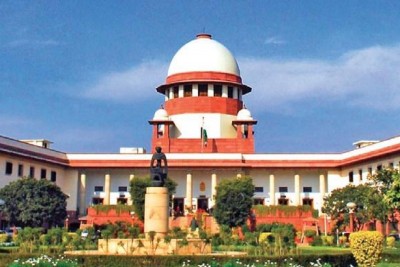New Delhi, Feb 11 : A citizen who suffers from a Writer’s Cramp travelled a long journey to the Supreme Court with a hope of getting a scribe in the civil services examination. His hopes were not dashed, and instead, he brought to the court’s attention the aspirations of a whole class of persons whose daily engagement with physical disability defines their continuing quest for dignity.
In a 62-page verdict, a bench, headed by Justice D.Y. Chandrachud and comprising Justices Indira Banerjee and Sanjiv Khanna, said: “A generation of disabled people in India regards as its birthright access to the full panoply of constitutional entitlements, robust statutory rights geared to meet their unique needs and conducive societal conditions needed for them to flourish and to truly become co-equal participants in all facets of life.”
Vikas Kumar has a disability in the form of dysgraphia, commonly known as a Writer’s Cramp. In August 2016, he graduated with an MBBS degree from the Jawaharlal Nehru Institute of Post Graduate Medical Instruction and Research and aspired to have a crack at the UPSC exams, but he was denied the use of a scribe.
The bench noted that the case has been through a maze of statutes, rules, and regulations, and it raises core issues about the actual realisation of equal opportunity and access to the disabled.
“We, therefore, hold and declare that the appellant would be entitled to the facility of a scribe for appearing at the Civil Services Examination and any other competitive selection conducted under the authority of the government,” it said.
The top court also cited the divergent views of two central ministries – the Department of Personnel & training and the Ministry of Social Justice and Empowerment — before the court and termed it a symptomatic of a policy disconnect. “We express our disquiet about the fact that, in a policy matter with profound consequences for India’s disabled population, the left hand does not know what the right one is doing,” it noted.
The bench stressed that Right of Persons with Disability (RPwD) Act 2016, tells them that they belong, that they matter, that they are assets, not liabilities and that they make us stronger, not weaker.
Writer’s cramp has been found successively to be a condition which Kumar has, making it difficult for him to write a conventional examination. The top court also cited several medical authorities, including AIIMS, opining that Kumar has a specified disability inasmuch as he has a chronic neurological condition. The bench said to deny the facility of a scribe in a situation such as the present would negate the valuable rights and entitlements which are recognised by the RPwD Act.
The bench emphasised that imposition of the criterion of a benchmark disability to access a scribe – an arena in which it has no relevance as per the statutory framework – betrays a profound lack of awareness on the part of the authorities about the RPwD Act 2016.
The bench opined that provision for the facility of a scribe is in pursuance of the statutory mandate to ensure that persons with disabilities are able to live a life of equality and dignity based on respect in society for their bodily and mental integrity.
Citing the Act, the bench said: “By opening doors for them and attenuating the barriers thwarting the realisation of their full potential, it seeks to ensure that they are no longer treated as second class citizens.”
The top court also directed the Centre to frame guidelines and norms within three months to protect the rights of disabled students to appear in all competitive examinations with help of scribe in conformity of the progressive outlook of Rights of Persons with Disabilities Act.
Kumar’s request for the Civil Services Examination Rules 2018 was rejected on the ground that a scribe could be provided only to blind candidates and candidates with locomotor disability or cerebral palsy with an impairment of at least 40 per cent.
Disclaimer: This story is auto-generated from IANS service.

